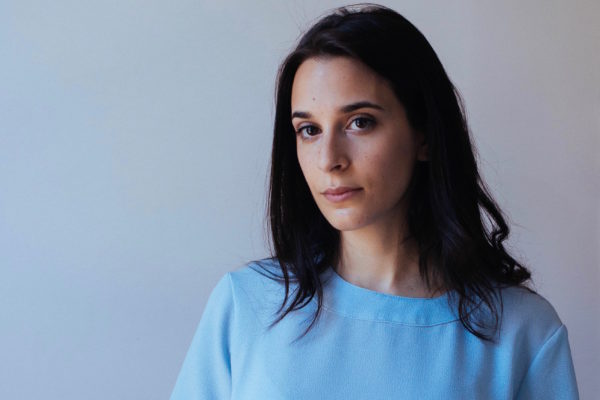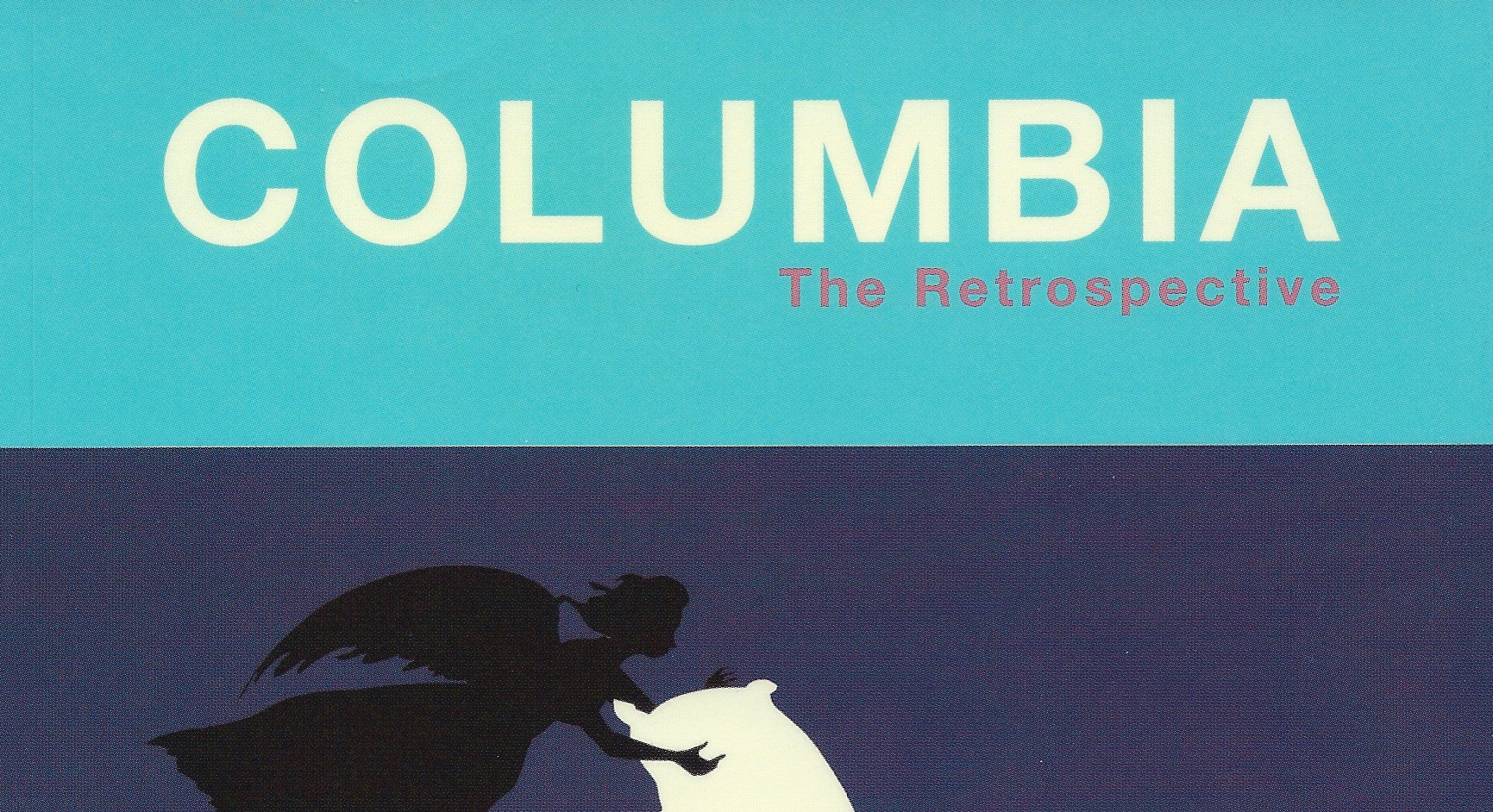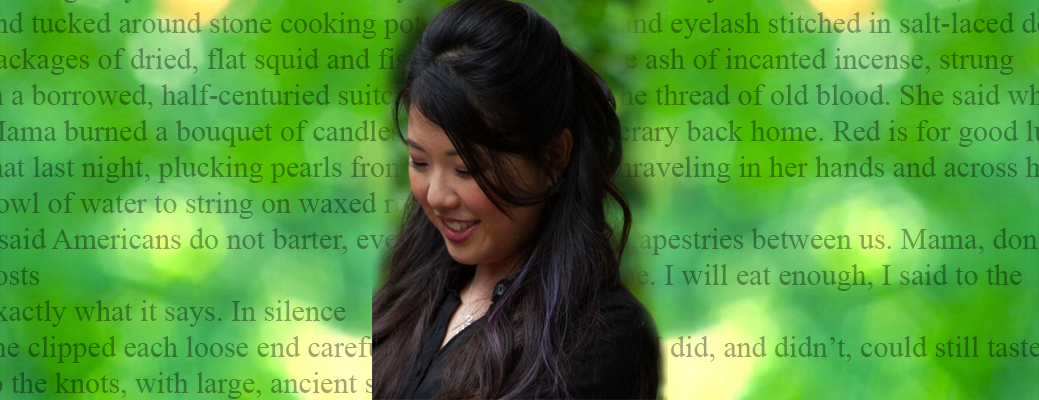Fiction by Columbia MFA graduate Kayla Maiuri: excerpt from Cardboard House.
Prologue
My mother didn’t come with us the morning my father drove me to the train station. She looked up from her magazine to nod goodbye and that’s how I remember her—sitting on the couch in her powder-blue nightgown, doodling in the margins of Country Living. She sat cross-legged with an iced coffee wedged in her lap, her nightgown riding up to expose the patch of black between her legs. When she caught me staring, she adjusted the coffee cup, not even embarrassed. “Well, what the hell,” she said, after I made a face. “Don’t look then.”
By then, the summer I turned eighteen, my mother was living on the couch. The burgundy leather had dried and cracked beneath her weight, and on the spot that pillowed her head of unwashed hair lived a permanent splotch of oil. Each morning, the local news channel played on mute. She said the electric hum kept her company.
Sunlight came through the bay windows of the family room. It landed in rectangles on the ashen floorboards, illuminating the dog hairs that clung to her wool socks, which she wore despite the August heat, stretched and bunched at the ankles. I didn’t want to look at her so I settled on the spot just above her shoulder, which inched upwards each time she inhaled. Her breath was labored, slightly mechanic as it caught in her throat. She didn’t look at me either.
She was helplessly, contagiously sad, her nutmeg-colored hair twisted in a cluster atop her head, her face eternally half-asleep.
I wavered in front of her, half-blocking the television as the strap of my duffel bag dug a valley into my shoulder. My hair tangled in the strap. Loose, raven-black strands clung to my arms like spider webs. I brushed them away, glancing down at my gangling figure—all arms and legs; skin milky-hued despite the brutal summer.
I’d spent the last three months locked away with my books and my music, basking in the pleasant flutter of papers as the ceiling fan pushed warm air around the small yellow room. I counted down the days, in my mind having already left. I didn’t have any expectations for New York—just the misty, haloed idea that it was where my true life was waiting for me, a place where it was not absurd to be alone.
The family room belonged to her; mildewed and cluttered, several degrees warmer than the rest of the house. It was a nest for yogurt cups and depleted water bottles, beaten magazines sloshed in a pile. Everything was strategically placed to limit her movements. On the side table sat a porcelain bowl of plum tomatoes, still connected to the vine, which my mother liked to pluck and bite into like apples. Tomato juice trickled down her arms, pooled in the fabric of her nightgown. In the years that her illness transpired, her space accumulated more and more objects. The room shrunk and withered, until it resembled a woodsman’s cottage.
With disgust, I watched my mother shake her cup to part the ice, slurp up the wet clumps of sugar that piled at the bottom. Raw sugar grains clicked across her molars. I looked away, coddled my waist in my arms and massaged my ribs with both thumbs. I’d thrown up that morning. First in the toilet, then in the shopping bag next to my bed. My bare knees digging into uneven floorboards as my insides splattered into breathing plastic. I was nervous to leave the only place I knew, this small mountain town with its historic iron mills and farmhouses. Ford pickups parked in un-paved driveways and overworked men in camouflage.
I suppose it was a combination of nerves and waking up too early—immersed in a breathless exhaustion that made my whole body spin. It would happen again on the train to New York, only then I would be alone, hunched forward in the seat as the bile came out like a silent stream into my scarf. None of the other passengers said a word. No one even looked up.
“You sure you don’t want to come for the ride?” I asked.
“Are you friggin’ kidding me?” My mother uncapped her coffee cup, stuck a finger inside to fish out an ice cube.
I shifted to the other leg, exhaled, tried to draw her out.
“Why would I want to come?” she asked, in her graceless Boston accent.
Her chin tripled as she looked down at her magazine. Then she shifted. There was a crinkling sound and the silver glint of a wrapper jammed between the cushions. An orange vial of pills slipped and rattled from behind her back. My mother draped an arm over the spot and I looked away, turning to the blackened windowsills, where dirt-colored moths lay half-dead, twitching in the glint of light. On the table by the window sat a jug of flowers, which my mother accidentally clipped too short, and now they leapt from the jug each time she rearranged them. Dried and wrinkled on the tabletop.
“What are those anyway?” I pointed to the vase.
My mother waved a hand and scoffed. “Suicidal gardenias,” she said.
Outside, the grass was dried and yellowed, overtaken by grubs, and beneath the window my mother’s herb garden was abandoned. The fig trees, now dormant, were not in their usual spot lining the hill in our backyard. They had been in the basement for two years and there would be no reviving them.
I had to ignore the grime, the pills, and the hidden food. The sour yogurt smell. There was no use in reprimanding my mother. It only indulged her sadness, sunk her deeper into the cushions. And I had other reasons.
I was almost free.
I can picture the size of my mother, remember the snap of her joints as she pushed herself off a chair, or the sight of her in a department store—crouching to pick something off the floor only to lose her balance and tip backwards onto speckled linoleum. The other mothers gawked, the whites of their eyes shiny with excitement, hangers clinking as they peered above the aisles. They wore jogging suits and perfected messy buns, their car keys attached to the tiny wallets gripped in their hands. They outwardly marveled at the size of my mother. They watched as she reeled on her backside, arms and legs like an upturned turtle.
My two younger sisters would look to me for guidance, as if I knew what to do. I gestured to my mother. Two of us grabbed her arms while the other delicately pressed my mother from behind, conscious of her little fingers digging into my mother’s skin. This only happened once or twice, but I don’t forget it. Sometimes I dream about it.
On hot afternoons, she lingered in the air-conditioned stores, fanning herself with the pamphlets she found at the register. A thin layer of moisture appeared on my mother’s cheeks and forehead and the tops of her arms, like the cool sheen of wet clay. Sometimes she sat on a decorative chair or a windowsill, pointing to things from afar and asking if we liked them. I ignored her, migrated deeper into the store. I avoided the sight, and her voice, and that smell that was distinctly hers, the smell of damp skin. I encouraged Lia and Sofia to follow. I made them believe that if we created enough distance, no one would know we belonged to her.
Back on the sidewalk, my mother lagging behind. She collapsed onto trash bins and mailboxes. Flecks of white saliva leapt from her lips as she choked on her own breath. She tugged at the collar of her cotton dress and I kept walking—my clogs scuffing the concrete, a green-apple Jolly Rancher lodged between my lips. My sisters fast-walked to keep up.
“Come on, Diana,” I said, calling my mother by name. I motioned for her to follow once I was certain no one was looking.
I was embarrassed of her timid smiles and her frantic shuffles, the way she held her breath when someone passed her, as if that would somehow make her smaller. Teenage girls whispered behind her. Boys imitated the way she walked, like drooling, bumbling oafs. They swooped into wide turns to pass the heaving creature that was my mother. I felt sorry for her but I didn’t tell her this. I didn’t defend or comfort her.
#
She was happier in colder weather. In the last days of fall she sat on the porch swing, barefoot and wrapped in my father’s corduroy jacket, looking out at the woods with the pug lying at her feet. “Where is everybody, Bear?” she asked, offering him a lick from her yogurt cup. “You miss your sisters?” She rubbed his back with the bottom of her calloused foot, a clear piece of tape stuck to her heel.
Through the screen door we heard her call for us. Then we joined her on the porch while she talked to herself and to the dog. Smoke billowed from the pile of burning leaves in the neighbor’s yard. Even now, this is the most comforting scent I know. It reminds me of the hours we spent monkeying around on the railings, our white tights catching on splinters, magenta-colored fingernails digging into the soft pine—and as we got older, the three of us sitting cross-legged in our jeans and turtlenecks with People magazine resting in our laps.
The neighbors peered out their lighted windows, watching us in the cold. I stood in front of my mother to shield her from view. I didn’t want them to see her nightgown and her black feet, the slick cowlick in the back of her hair that hadn’t been washed in days.
“I’m going to put a fairy garden back here,” my mother said, rocking on the wooden swing. “So the fairies will come.”
Sofia, the youngest, looked to me, confused. Lia backed away, her heels crunching on the dry leaves scattered on the porch. As if she thought she would catch something. I was engrossed by my mother; both disturbed and intrigued. I wanted to know if she believed the things she said out loud, or if she shared them for other reasons. The prospect of this make-believe world seemed to bring her comfort, as if she were a child.
She glanced back to the trees, her hair wrapping around her like a scarf.
At the edge of our yard, wet orange slices gleamed on tree branches. My mother pierced them there, an offering for the weaker birds that hadn’t left in time to migrate. I inhaled deeply to smell the fruit but only found the scent of burning leaves. So I imagined the citrus smell, wafts of it feathering through the smoke. On the ground lay pinecones my mother had smeared with peanut butter and rolled in a layer of seeds. Against the thick backdrop of woods, animals flapped and scurried. The forest was alive.
“That’s what I’ll do,” my mother said. “Build a fairy garden.” She nodded, as if we agreed. I think she was trying to be strange. She wanted us to see it. And a part of me was happy to give this attention to her. But then, how deeply did I wish for a regular mother—a woman to protect me, to need nothing from me.
“My arm is numb,” she said, and she lifted her arm to show us. “I can’t feel it.”
“Since when?” I asked.
“Since I woke up.”
Lia and Sofia swayed as they watched her, their noses running, lips turning blue.
It was impossible to know what was real or imagined, when or if I should worry.
My mother ran her fingers from her wrist to her elbow, dropped her arm in her lap. Then she looked at me, perhaps waiting for me to say something. I fingered a splinter in my palm, the skin red and flaking from the dry air. I was too aware of this role reversal—a twelve-year-old mothering her mother—fixed in a place of pity and resentment.
“That’s weird,” I said, narrowing my eyes, pretending to give it some thought.
I leaned against the porch railing, ripping leaves from their stems while my mother talked to the wind. The four of us remained outside until the orange sun swelled behind the trees and we could no longer stand the cold.
#
My mother was charismatic, magnetic, a perpetual child as she leaned out the back door to feed loaves of bread to wild turkeys. Her hair, when clean, fell past her shoulders in waves. She was lovely in the dandelion sunlight—her gestures lively and spirited as she stretched her arms outward, talked to the birds like people. During those moments, I felt lucky to have her.
But it’s easy for me to get lost in the shiny lacquer of childhood memories, before I blackened things with significance. I have not seen my mother in four years, since before I left for college, and in that time there’s been room for forgetting. I can barely picture the fawn-colored freckles splayed across her face, a patch of white on her nose where the freckles disappeared because she wrinkled it so often. She was allergic to the guinea pig my father bought us one Christmas. It made the translucent skin beneath her eyes swell and turn pink, so she dabbed them with damp pieces of toilet paper, left a trail of crumpled tissue around the house.
I think of my family at quiet times, in the mornings when I sit on the fire escape, lonely and slumped over tea. I imagine my mother at the table, pressing her fingers onto the oven tray to pick up popcorn chicken crumbs, pocket-sized tissues tumbling out of her sleeves. My father isn’t there but there are always traces of him: a yellow hard hat sitting on the mudroom bench, a can of Planters peanuts next to a fishing manual.
In my mind, Lia sits on the chair beside my mother, pushes her glasses to the bridge of her nose while she reads The Secret Garden. And perched on the kitchen island is little Sofia, humming while she works on one of her art projects. She always smells like maple syrup, even when she hasn’t had any.
A familiar sickness rises in my stomach. A feeling of regret, or longing—the indescribable need to be back in that house. In my mind, we don’t age. We’re three scrubby-haired girls, nine, eleven, and twelve.
Kayla Maiuri (website) was born and raised in Boston, Massachusetts. She holds an MFA in fiction from Columbia University, where she served as fiction editor of Columbia: A Journal of Literature & Art. She is now an editor at EuropeNow, a journal of political research and art based at Columbia.




